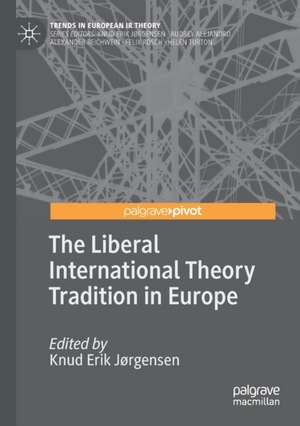The Liberal International Theory Tradition in Europe: Trends in European IR Theory
Editat de Knud Erik Jørgensenen Limba Engleză Paperback – 6 ian 2022
| Toate formatele și edițiile | Preț | Express |
|---|---|---|
| Paperback (1) | 445.88 lei 43-57 zile | |
| Springer International Publishing – 6 ian 2022 | 445.88 lei 43-57 zile | |
| Hardback (1) | 451.26 lei 43-57 zile | |
| Springer International Publishing – 5 ian 2021 | 451.26 lei 43-57 zile |
Preț: 445.88 lei
Nou
Puncte Express: 669
Preț estimativ în valută:
85.33€ • 88.54$ • 71.32£
85.33€ • 88.54$ • 71.32£
Carte tipărită la comandă
Livrare economică 17-31 martie
Preluare comenzi: 021 569.72.76
Specificații
ISBN-13: 9783030526450
ISBN-10: 3030526453
Pagini: 143
Ilustrații: XII, 143 p. 1 illus.
Dimensiuni: 148 x 210 mm
Greutate: 0.21 kg
Ediția:1st ed. 2021
Editura: Springer International Publishing
Colecția Palgrave Pivot
Seria Trends in European IR Theory
Locul publicării:Cham, Switzerland
ISBN-10: 3030526453
Pagini: 143
Ilustrații: XII, 143 p. 1 illus.
Dimensiuni: 148 x 210 mm
Greutate: 0.21 kg
Ediția:1st ed. 2021
Editura: Springer International Publishing
Colecția Palgrave Pivot
Seria Trends in European IR Theory
Locul publicării:Cham, Switzerland
Cuprins
1.Introduction: The Liberal International Theory Tradition in Context, Knud Erik Jørgensen.- 2.Liberal IR Theorizing During the Early Twentieth Century: 1900–1939, Lacin Idil Öztığ.- 3. Liberalism and Domestic Politics Approaches in IR, Aukje van Loon.- 4. Republicanism and Liberal International Theory, Kevin Blachford.- 5. Liberal European Peace Theories and Their Critics, Lothar Brock and Hendrik Simon.- 6. Liberal Security Theories, Kamil Zwolski.- 7. When Liberalism Meets the English School, F. Asli Ergul Jorgensen.- 8. Classical Liberalism and IR Theory, Edwin van de Haar.- 9. Conclusion and Perspectives, Knud Erik Jørgensen.
Recenzii
“The book is formative and well-argued in addressing the liberal IR tradition in Europe; it presents a number of significant liberal political theorists and philosophers and relates them meaningfully to timely questions. Thus, it is recommended for academicians and postgraduate students in International Political Theory. To conclude, understanding international affairs necessities an extensive comprehension of liberalism and its tradition. The volume serves this purpose and functions as an effective, historically detailed reading on liberal traditions in Europe.” (Fadi Zatari, Insight Turkey, Vol. 24 (1), 2022)
Notă biografică
Knud Erik Jørgensen is Professor of International Relations at Aarhus University, Denmark. He has held previous appointments as a Jean Monnet Fellow at the European University Institute in Florence, Italy and with Yaşar University in Izmir, Turkey.
Textul de pe ultima copertă
This book examines how the liberal international theory tradition evolved in Europe. It includes nine chapters focusing on both historical and contemporary branches of liberal IR theorizing. The combined portrait of the prominent IR theory orientation shows a long and rich theoretical tradition but also a tradition that the scholarly community rarely fully recognize. It is currently somewhat challenged and therefore in need of further advances. Concerning the historical branches, the authors present a truly European tradition that thus was not only present in a few countries. The contributors introduce examples of liberal theorizing that IR scholars tend to dismiss and they trace the boundaries between the liberal and other theoretical traditions. Given the prominence of the tradition, the book is surprisingly among the first to present a transnational perspective on the development of the liberal international theory tradition in Europe.
Knud Erik Jørgensen is Professorof International Relations at Aarhus University, Denmark. He has held previous appointments as a Jean Monnet Fellow at the European University Institute in Florence, Italy and with Yaşar University in Izmir, Turkey.
Knud Erik Jørgensen is Professorof International Relations at Aarhus University, Denmark. He has held previous appointments as a Jean Monnet Fellow at the European University Institute in Florence, Italy and with Yaşar University in Izmir, Turkey.
Caracteristici
Among the first to offer a transnational portrait of the liberal international theory tradition in Europe Offers a critical appraisal of the trajectories of liberal IR theory Provides a thought-provoking invitation to reconsider the dynamics of theoretical IR traditions





